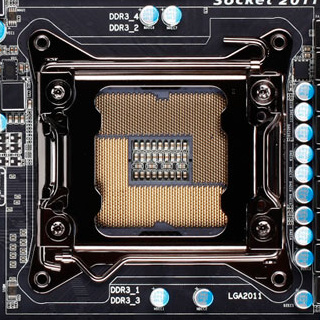4
Cores
8
Threads
130 W
TDP
3.7 GHz
Frequency
3.9 GHz
Boost
Ivy Bridge-E
Codename
Socket 2011
Socket


Intel Socket 2011
The Intel Xeon E5-1620 v2 was a server/workstation processor with 4 cores, launched in September 2013. It is part of the Xeon E5 lineup, using the Ivy Bridge-E architecture with Socket 2011. Thanks to Intel Hyper-Threading the core-count is effectively doubled, to 8 threads. Xeon E5-1620 v2 has 10 MB of L3 cache and operates at 3.7 GHz by default, but can boost up to 3.9 GHz, depending on the workload. Intel is making the Xeon E5-1620 v2 on a 22 nm production node using 1,860 million transistors. The multiplier is locked on Xeon E5-1620 v2, which limits its overclocking potential.
With a TDP of 130 W, the Xeon E5-1620 v2 consumes a lot of power, so good cooling is definitely needed. Intel's processor supports DDR3 memory with a quad-channel interface. The highest officially supported memory speed is 1866 MT/s. ECC memory is supported, too, which is an important capability for mission-critical systems, to avoid data corruption. For communication with other components in the system, Xeon E5-1620 v2 uses a PCI-Express Gen 3 connection. This processor lacks integrated graphics, you might need a graphics card.
Hardware virtualization is available on the Xeon E5-1620 v2, which greatly improves virtual machine performance. Additionally, IOMMU virtualization (PCI passthrough) is supported, so that guest virtual machines may directly use host hardware. Programs using Advanced Vector Extensions (AVX) can run on this processor, boosting performance for calculation-heavy applications.
With a TDP of 130 W, the Xeon E5-1620 v2 consumes a lot of power, so good cooling is definitely needed. Intel's processor supports DDR3 memory with a quad-channel interface. The highest officially supported memory speed is 1866 MT/s. ECC memory is supported, too, which is an important capability for mission-critical systems, to avoid data corruption. For communication with other components in the system, Xeon E5-1620 v2 uses a PCI-Express Gen 3 connection. This processor lacks integrated graphics, you might need a graphics card.
Hardware virtualization is available on the Xeon E5-1620 v2, which greatly improves virtual machine performance. Additionally, IOMMU virtualization (PCI passthrough) is supported, so that guest virtual machines may directly use host hardware. Programs using Advanced Vector Extensions (AVX) can run on this processor, boosting performance for calculation-heavy applications.
Physical
| Socket: | Intel Socket 2011 |
|---|---|
| Foundry: | Intel |
| Process Size: | 22 nm |
| Transistors: | 1,860 million |
| Die Size: | 257 mm² |
| Package: | FC-LGA12A |
| tCaseMax: | 70°C |
Processor
| Market: | Server/Workstation |
|---|---|
| Production Status: | End-of-life |
| Release Date: | Sep 10th, 2013 |
| Part#: | QF7X SR1AR |
Performance
| Frequency: | 3.7 GHz |
|---|---|
| Turbo Clock: | up to 3.9 GHz |
| Base Clock: | 100 MHz |
| Multiplier: | 37.0x |
| Multiplier Unlocked: | No |
| TDP: | 130 W |
Architecture
| Codename: | Ivy Bridge-E |
|---|---|
| Generation: |
Xeon E5
(Ivy Bridge-E) |
| Memory Support: | DDR3 |
| Rated Speed: | 1866 MT/s |
| Memory Bus: | Quad-channel |
| ECC Memory: | Yes |
| PCI-Express: | Gen 3 |
Core Config
| # of Cores: | 4 |
|---|---|
| # of Threads: | 8 |
| SMP # CPUs: | 1 |
| Integrated Graphics: | N/A |
Cache
| Cache L1: | 64 KB (per core) |
|---|---|
| Cache L2: | 256 KB (per core) |
| Cache L3: | 10 MB (shared) |
Features
|
Feb 22nd, 2025 07:41 EST
change timezone
Latest GPU Drivers
New Forum Posts
- Windows 11 General Discussion (5689)
- 572.42 Drivers, Screen Blacking Out? (9)
- Nvidia's GPU market share hits 90% in Q4 2024 (gets closer to full monopoly) (479)
- Solidigm NVMe Custom Modded Driver for All NVMe Brands SSDs & Any NVMe SSDs (203)
- can you use 2 of the same model "centers" as 2.0 ? (1)
- Warning about DOCP (12)
- Is this thermal paste or phase change pad? (4)
- It's happening again, melting 12v high pwr connectors (858)
- Bizarre issue (0)
- PC Turns Off Immediately After Pressing Power Button--Must be Held Down to Power On (2)
Popular Reviews
- MSI GeForce RTX 5070 Ti Ventus 3X OC Review
- Gigabyte GeForce RTX 5090 Gaming OC Review
- Galax GeForce RTX 5070 Ti 1-Click OC White Review
- ASUS GeForce RTX 5070 Ti TUF OC Review
- Ducky One X Inductive Keyboard Review
- MSI GeForce RTX 5070 Ti Vanguard SOC Review
- MSI GeForce RTX 5070 Ti Gaming Trio OC+ Review
- darkFlash DY470 Review
- MSI MAG Z890 Tomahawk Wi-Fi Review
- Palit GeForce RTX 5070 Ti GameRock OC Review
Controversial News Posts
- NVIDIA GeForce RTX 5090 Spotted with Missing ROPs, NVIDIA Confirms the Issue, Multiple Vendors Affected, RTX 5070 Ti, Too (306)
- AMD Radeon 9070 XT Rumored to Outpace RTX 5070 Ti by Almost 15% (302)
- AMD Plans Aggressive Price Competition with Radeon RX 9000 Series (269)
- AMD is Taking Time with Radeon RX 9000 to Optimize Software and FSR 4 (256)
- AMD Radeon RX 9070 and 9070 XT Listed On Amazon - One Buyer Snags a Unit (247)
- Edward Snowden Lashes Out at NVIDIA Over GeForce RTX 50 Pricing And Value (241)
- AMD Denies Radeon RX 9070 XT $899 USD Starting Price Point Rumors (239)
- New Leak Reveals NVIDIA RTX 5080 Is Slower Than RTX 4090 (215)
